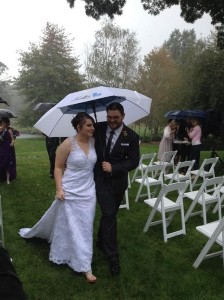May 1 is something of an anniversary for me – it’s a year today since my thyroid and the tumour attached to it were removed. So, what’s changed? What’s happened? What did I learn in that time? Perhaps just as importantly, what has stayed the same?
I’ll start with a change. A colleague and teacher, Kate Bowles, has written thoughtfully about her own cancer. Kate says this:
a cancer diagnosis is a status change like becoming a parent. Even when your child moves out of home, even if your child dies, you are still a parent. That part never gets unmade.
I had noticed this, but I couldn’t quite articulate it, which is why I’ve let Kate do the talking.
Some other more obvious changes:
We got married (and it rained!)

and we got a cat:
One thing that didn’t change is my employment or studies. About three months before my diagnosis, I was weighing up whether to do a PhD or a Graduate Diploma of Education (GDE). I got accepted into both, but took the PhD and it’s associated scholarship. That also meant I kept my part-time job in social media at UOW.
I feel very fortunate to have made that decision because I haven’t needed to stop my research for any extended period due to the flexibility of a PhD in the humanities. Had I begun the GDE, I would’ve necessarily missed compulsory classes or practical experience and subsequently withdrawn from the course.
Aside from that, my supervisors have been incredibly helpful and supportive. Obviously I have missed research time due to medical appointments and stays in hospital, but I only needed to take 3 weeks leave in total.
The supervisors and staff at my other job have also been great, and very flexible. I am a casual, so obviously I lost pay for the time I did take off work, but since it was only a few days here and there and my boss was happy to make up hours at other times, I was never particularly stretched.
I’ve emphasised here the support and flexibility of the individuals involved. That isn’t because systemically or institutionally there was a lack of needed support, but that the institution remained largely invisible to me through this period. Indeed, for PhD students who do need time off, the option is to take unpaid leave from research, which might seem like a degree of academic failure. Kate points out the “deficit-driven measurement of value at work” in a university environment which focuses on the few successes to the point that the greater number of ‘fails’ (like the 80% of non-funded ARC applications).
I can’t really speak to the culture of academia generally, but for my stage and the particular set of challenges associated with my illness, the set up worked pretty well. Though the institution was invisible, the individuals within it were present, supportive and flexible as I needed them to be.